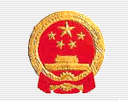|
 |
?
? |
|
|
Structure of the State |
 |
 |
The Party
in Power |
 |
? |
|
|
| The Communist
Party of China (CPC) is the party in power in the country. The CPC
has both central and local organizations. At the top is the Central
Committee and, while when it is not in session, the Political Bureau
and its Standing Committee exercise the power of the Central Committee.
Both the Political Bureau and its Standing Committee are elected by
the plenary session of the Central Committee. |
|
|
 |
The Military |
 |
? |
|
|
| The Central
Military Commission of the People's Republic of China is the
highest state military organ with the responsibility of commanding
the entire armed forces in the country. Led by a chairman and consisting
of vice chairmen and members, the Commission is elected for a term
of five years and can stand for reelection. |
|
|
 |
The Head
of the State |
 |
? |
|
|
| The president,
as the head of the state, promulgates laws, appoints the premier,
vice premiers, state councilors, ministers of various ministries and
state commissions, the auditor-general, and the secretary-general
of the State Council, according to decisions of the National People's
Congress and its standing committee. The president also confers awards
and honorary titles of the state, issues order of special amnesty,
and martial law, declares state of war and announces order of general
mobilization. |
|
|
 |
The Organ
of State Power |
 |
? |
|
|
| The National
People's Congress is the organ of supreme power in the People's
Republic of China. Its permanent organ in office is the Standing Committee.
Both the NPC and its Standing Committee are elected for a term of
five years. They exercise the power of legislation, decision, supervision,
election, appointment and dismissal. |
|
|
 |
The State
Administrative Organ |
 |
? |
|
|
| The administrative
branch of the state power is the Central People's Government
and local people's governments. The State Council, another term
for the Central People's Government, is the supreme administrative
organ of state power. |
|
|
 |
The State
Trial Organ |
 |
? |
|
|
| The people's
courts are the trial organs of the state. The trial system consists
of the Supreme People's Court, local people's courts and
special people's courts such as the military court. |
|
|
 |
The State
Prosecution Organ |
 |
? |
|
|
| The people's
procuratorates are the legal supervision organs of the state. The
prosecution system consists of the Supreme People's Procuratorate,
local people's procuratorates and special people's procuratorates
such as the military procuratorate. |
|
|
 |
The Political
Consultative Organ |
 |
? |
|
|
| The Chinese
People's Political Consultative Conference is a united front
organization under the leadership of the Communist Party of China
and an organ for various other political parties, mass organizations
and personages of various social circles to take part in the running
of the state. |
|
|
 |
Social
Organizations |
 |
? |
|
|
| Mass organizations
are an important component in the political life in China. Despite
the fact that they are non-governmental organizations, the All-China
Federation of Trade Unions, the Communist Youth League of China and
the All-China Women's Federation exercise, to a fairly large
extent, some of the functions of the government. As a result, the
tasks, the organizational setup and posts of leaders of some mass
organizations are decided by organs of the central authorities. For
the same reason, these organizations receive appropriations from the
state treasury for funding. |
|
? |

